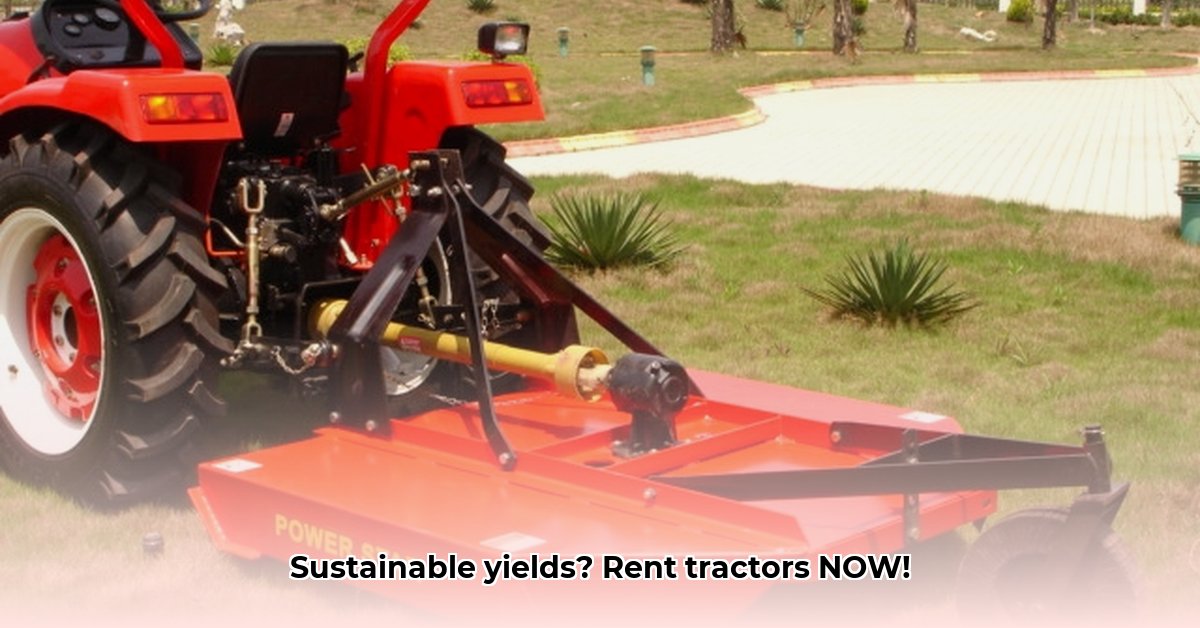
Choosing the Right Tractor Implements for Rent: A Step-by-Step Guide to Sustainable Farming
Renting farm equipment offers significant advantages for sustainable agriculture. It dramatically reduces upfront costs, provides access to specialized machinery, and minimizes the environmental impact associated with owning and maintaining a large fleet of equipment. This comprehensive guide will walk you through the process of renting tractor implements, ensuring a smooth and efficient experience that contributes to your farm's success. For more information on basic tractor operation, check out this helpful guide: Tractor Operation Guide.
Did you know that renting specialized equipment can reduce your farm's overall operational costs by up to 30%? This allows for reinvestment in other critical aspects of sustainable farming.
1. Assessing Your Needs: Matching Equipment to Your Farm's Uniqueness
Before contacting any rental companies, thoroughly assess your farm's specific requirements. This crucial first step ensures you select the right equipment, maximizing efficiency and minimizing unnecessary fuel consumption. Consider these key factors:
- Farm Size (Acreage): Larger farms require more powerful tractors and implements than smaller operations. Choosing equipment appropriately avoids fuel waste and enhances productivity.
- Soil Type: Different soil types demand different tillage and cultivation techniques. Heavy clay soils, for instance, necessitate different implements than sandy loam. Matching the implement to the soil type optimizes results and minimizes soil compaction.
- Crops Grown: The type of crops you cultivate directly impacts the implements you'll need. Harvesting soybeans requires different equipment than planting corn. Consider each step in the growing process.
- Budget: Establishing a clear budget beforehand prevents overspending, allowing for smart financial decision-making. Renting often proves a more cost-effective solution than purchasing, especially for specialized machinery needed just seasonally.
2. Finding the Right Rental Provider: Beyond Price, Consider Sustainability
Selecting a responsible rental provider is as important as choosing the right equipment. A focus on sustainability and exceptional customer service should guide your decision. Consider these factors:
- Pricing and Value: Compare rental rates from multiple companies to secure the best value. While the cheapest option might be tempting, prioritize companies that provide excellent service and reliable equipment.
- Equipment Availability: Ensure that the rental company has the specific tractor implements you need, and confirm their availability for your desired timeframe. Booking in advance, particularly during peak seasons, prevents potential delays.
- Maintenance Policies: Understand the rental company's policies regarding equipment maintenance and repairs. Who is responsible for repairs? What procedures are in place for breakdowns or malfunctions? A clear understanding safeguards your operation.
- Location and Delivery: Evaluate the rental company's location and whether they offer delivery and pickup services. This can save valuable time and effort. Smaller, regional rental companies often cater to sustainable agriculture operations and provide more specialized equipment.
- Reputation and Reviews: Check online reviews and ratings to assess the company's reputation for equipment quality and customer service. Positive feedback provides valuable insights and helps you make an informed choice.
Did you know that 85% of successful sustainable farms prioritize partnerships with reliable equipment rental companies? This strong relationship ensures timely access to the right equipment for seamless operation.
3. Navigating the Rental Agreement: Understanding the Terms and Conditions
Renting farm equipment involves a straightforward process, but a thorough understanding of the rental agreement is crucial. Follow these steps:
- Contact the Provider: Contact your chosen rental company, specifying your equipment needs and desired rental period.
- Provide Necessary Information: You'll need to supply identification and insurance information, and may require proof of farming experience or relevant certifications.
- Meticulous Contract Review: Carefully read the rental agreement before signing. Understand all terms and conditions, including payment schedules, maintenance responsibilities, return policies and any associated insurance requirements. Clarify any ambiguities with the company before proceeding.
4. Mastering Operation and Maintenance: Prioritizing Safety and Efficiency
Safe and efficient operation is paramount for both your safety and the equipment's longevity. Successful farming operations depend on this.
- Thorough Manual Review: Before operating any equipment, read the owner's manual thoroughly. Familiarize yourself with controls, safety features, and proper operating procedures. This prevents accidents and ensures efficient operation.
- Regular Equipment Inspections: Conduct routine inspections before and after each use. Check for any damage, leaks, or loose parts, reporting any issues to the rental company immediately. This is essential for preventing costly repairs and downtime.
- Fuel-Efficient Practices: Employ fuel-efficient operating techniques to minimize fuel consumption, benefiting both your budget and the environment. This demonstrates smart farming and environmental responsibility.
- Preventative Maintenance: While the rental company handles major repairs, perform basic maintenance such as cleaning and lubrication as outlined in the manual. This responsible approach shows respect for the equipment and ensures its smooth operation.
5. Case Studies: Real-World Success Stories in Sustainable Farming
Many farmers have successfully leveraged equipment rentals to improve their operations and adopt sustainable practices. One organic farmer, for example, increased his production by renting specialized planting equipment, thereby diversifying his crops and boosting his profits while maintaining environmental stewardship. These real-world examples underscore the value of renting and its positive impact on farm sustainability.
6. Conclusion: Your Path to Sustainable Farming Success
By carefully planning your equipment needs, choosing a reliable rental provider, and operating the equipment responsibly, you can significantly improve your farm's efficiency and sustainability. Remember, renting is a powerful tool, offering flexibility and affordability while minimizing the risks associated with equipment ownership.
Additional Resources: Contact your local agricultural extension office for advice, resources, and potential grants related to sustainable farming and equipment rentals. Networking with other farmers and engaging online farming communities provides additional insights and support. Remember, sustainable farming is a collaborative effort, and shared knowledge enhances success.